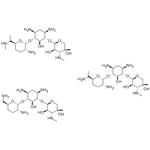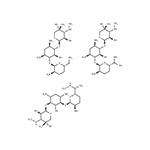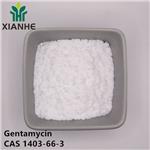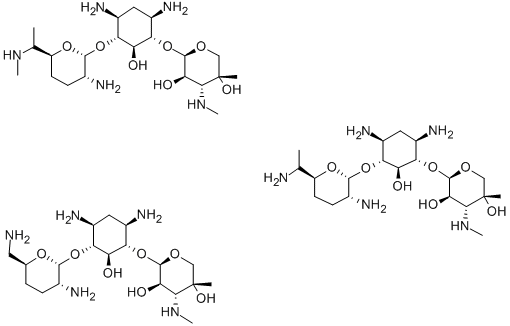What is Gentamicin?
Mar 11,2022
Gentamicin is a mixture of relatively equal amounts of three natural aminoglycosides, gentamicin C1, gentamicin C2, and gentamicin C1a, produced by Micromonospora purpurea and discovered in the Schering Research Laboratories. The three components are structurally related to the other natural aminoglycosides, streptomycin, kanamycin, neomycin, tobramycin, and sisomicin.
For about a decade after its discovery, gentamicin was usually the preferred drug for the treatment of severe infections caused by Gramnegative aerobic bacteria, particularly in hospitals. Since the mid1970s, its usefulness has decreased in some areas by the emergence of bacterial resistance. For some indications, more effective drugs have also become available, such as the third-generation cephalosporins and the fluoroquinolones.
MECHANISM OF DRUG ACTION
Gentamicin inhibits bacterial growth by inhibiting protein synthesis, and the main mechanism of its action appears to be similar to that of streptomycin. Gentamicin binds to a particular protein or proteins of the 30S subunit of bacterial ribosomes and causes misreading of the genetic code. The drug is bactericidal in vitro, similar to other aminoglycosides. The bactericidal acitivty could be due to nonsense peptides produced because of the misreading of the genetic code, the nonreversible tight binding of the drug to the ribosome, or the interaction with the cell membrane. Gentamicin interacts with the cell envelope of P. aeruginosa and other Gram-negative bacilli; disruption of the cell wall occurs in a sequetial manner, moving from the outer membrane to the inner membrane, and may result in lysis of the cell. Gentamicin also appears to displace essential metal cations within the outer membrane. Thereafter, small transient holes are produced which make the outer membrane more permeable to the antibiotic. Gentamicin also inhibits the accumulation of extracellular proteases secreted by P. aeruginosa, enzymes which contribute to its pathogenicity. This inhibition occurs at gentamicin concentrations lower than those required to inhibit bacterial protein synthesis. Gentamicin and other aminoglycosides can produce a decrease in mammalian microsomal protein synthesis at concentrations approximating those accumulated in the renal cortex and in perilymph bathing the membranous labyrinth. Inhibition of mammalian protein synthesis may explain the toxicity of gentamicin and other aminoglycosides.
Drug interactions
Gentamicin and other aminoglycosides are partially inactivated by high concentrations of any of the penicillins both in vitro and in vivo. In patients with normal renal function, this can be avoided largely if the two antibiotics are not mixed together in the i.v. infusion fluid. Minimal in vivo inactivation would occur because the half-lives of the drugs are faster than the rate of inactivation. However, in patients with renal impairment, the half-lives of both drugs are increased and significant inactivation of gentamicin can occur; such patients require increased dosage of gentamicin to compensate for this. Heparin reversibly inhibits gentamicin activity in a dose-dependent way. Therefore, specimens for gentamicin estimations should not be put in heparinized tubes. When heparin is used clinically as an anticoagulant, its serum level is not high enough to affect the activity of gentamicin.
- Related articles
- Related Qustion
Ciprofloxacin is a fluoroquinolone (also called 4-quinolone, or quinolone carboxylic acid) which was developed by Bayer Pharmaceuticals for both oral and parenteral use. It is one of the second generation of quinolones (others include norfl....
Mar 11,2022API?Tobramycin, previously known as nebramycin factor 6, is an aminoglycoside aminocyclitol antibiotic, which is one of several compounds in an antibiotic complex (nebramycin) produced by Streptomyces tenebrarius.....
Mar 11,2022APIGentamicin
1403-66-3You may like
- Gentamicin
-

- 2026-02-06
- CAS:1403-66-3
- Min. Order:
- Purity: 0.99
- Supply Ability:
- Gentamicin
-

- $30.00 / 5mg
- 2026-02-03
- CAS:1403-66-3
- Min. Order:
- Purity:
- Supply Ability: 10g
- Gentamycin
-

- $0.00 / 1kg
- 2026-02-02
- CAS:1403-66-3
- Min. Order: 1kg
- Purity: 0.99
- Supply Ability: 1000kg





